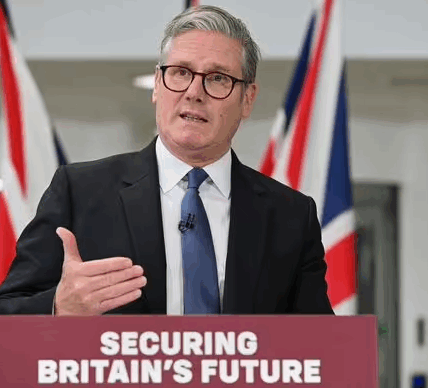Keir Starmer is desperate to stop voters abandoning Labour for independent candidates – and Jeremy Corbyn

Protest Against UK Visit Of Israeli President Herzog London (Image: Getty)
Keir Starmer is to “recognise” a Palestinian state within days. Marco Rubio, the US Secretary of State, says the announcement will have “no impact whatsoever” on the chances of bringing peace to the Middle East. And he said the British Government, along with France and other European countries, had taken the decision “because of their domestic politics”.
He’s right. The issue of Palestine and the war in Gaza has become a nightmare for Keir Starmer and his Labour colleagues. It’s led traditional Labour voters in some of our major cities to abandon Labour, giving their support to independent and left-wing politicians instead. This is the last thing Sir Keir needs as he battles to see off a threat Nigel Farage’s Reform UK, which is steaming ahead in the polls.
We saw this in the last general election, when four independent MPs were elected largely on a platform of opposing Israel’s assault on Gaza. That’s in addition to Jeremy Corbyn, also elected as an independent, who is a vocal supporter of the Palestinians.
But it could have been worse. Independents came second in a number of other seats, including those held by Cabinet Ministers Wes Streeting and Shabana Mahmood.
And the pro-Palestine left is organising. A new party led by Jeremy Corbyn and former Labour MP Zarah Sultana, currently known as “Your Party”, will hold a conference in November while an online ballot of activists next month will choose a permanent name. Ms Sultana is to take part in a discussion next month with Zack Polanski, the newly-elected Green Party leader, on how they can “unite to win.”
Unlike Mr Farage, none of these left-wing politicians have a serious chance of becoming Prime Minister. And the whole thing could soon descend into in-fighting and division, with rumours already circling that allies of Mr Corbyn and allies of Ms Sultana are at loggerheads.
But the resurgent left could take enough votes from Labour in specific seats to cause real harm. There are constituencies with large Muslim populations that have overwhelmingly voted Labour in the past. Anger over Gaza (and Kashmir, an issue that receives far less attention outside Muslim communities but provokes strong emotions) could cause these voters to abandon Keir Starmer’s party.
In addition, the Liberal Democrats have been highly critical of Israel from an early stage. The Lib Dems enjoyed a surge in support for opposing the invasion of Iraq in 2003 and may reap similar awards this time.
Sir Keir was unequivocally supportive of Israel following the Hamas terror attack on October 7 2023. As recently as June this year, he said: “Israel has the right to be safe and secure, and it is neither safe nor secure at the moment. We have to be absolutely clear about that and about the right of Israel to defend itself.”
But his tone has changed. In a meeting with Israeli president Isaac Herzog this month, Sir Keir “reiterated his huge concern and implored Israel to change course”, Downing street said. Sir Keir told Israel it must end a famine in Gaza by “halting their offensive operations”, according to Number 10.
Recognising Palestine is part of an effort by Sir Keir to win back the support of British voters who oppose Israel, and feel that he has been on the wrong side.
What’s far from clear is what practical difference it will make in the Middle East.
If the UK recognises Palestine as a country, does that mean we will open an embassy and send an ambassador (we currently have a consul-general instead, a less senior official)?
Will we call for Palestine to be have a seat in the United Nations like other countries (it currently has non-member observer status)?
And will we recognise the official government of the Palestinians, the Palestinian Authority based in Ramallah in the West Bank, or will we in some way also recognise Hamas, the Iranian-backed terror group that is the de facto government of Gaza?
On the bigger picture, Sir Keir Starmer is right. The only long-term answer to the conflict between Israel and the Palestinians is the establishment of an independent, viable and sovereign Palestinian state to live in peace alongside Israel, something the official Palestinian government says it supports. Hamas, of course, is vehemently opposed to peace, as is the Israeli far right.
The UK’s position for decades has been that a country called Palestine should exist.
But “recognising” Palestine right now will achieve nothing, because there currently is no such country. There should be. But there isn’t.


